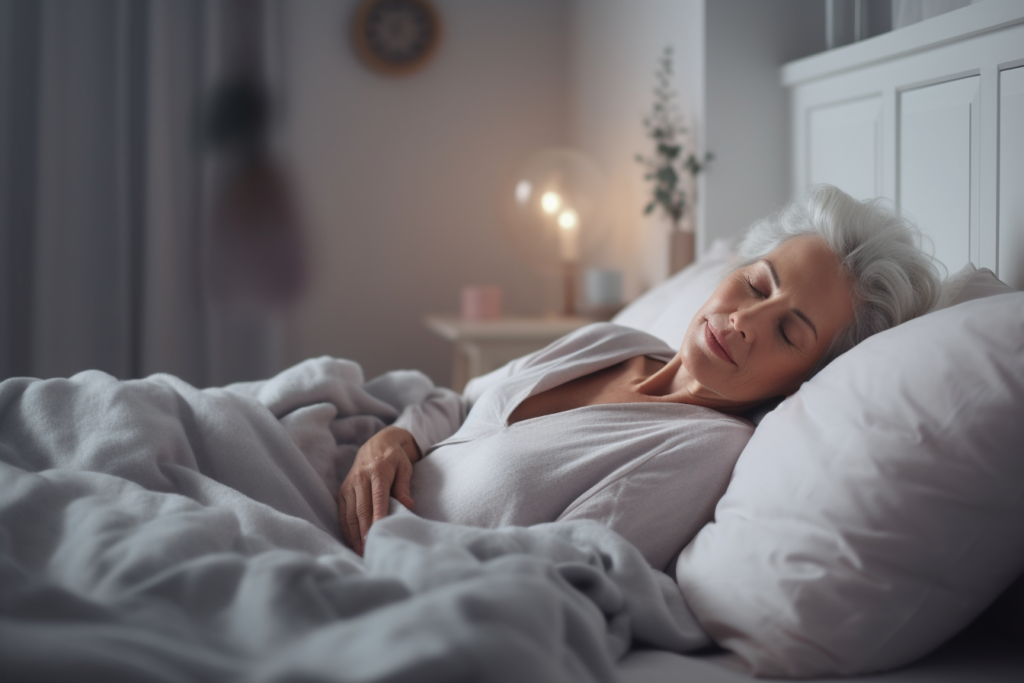Why sleep decline happens during menopause
Waking up feeling like you’ve turned into a hot-water bottle and wondering where your peaceful sleep went? You are not alone. In fact, around 75-85% of women experience this rollercoaster of nighttime heat and sleep disruption. Let’s dive into why this happens and explore personalized tips to help you get those precious Zzz’s back.

As your body goes through the menopausal transition, hormonal changes occur. Estrogen and progesterone, once steady players in your hormonal symphony, start dancing to a new beat. These hormonal shifts can mess with your body’s internal clock and mess up the production of sleep-friendly chemicals like serotonin and melatonin. The result? Nighttime becomes a battle between you and the sheets. Unfortunately, it’s something of a vicious cycle. You sleep badly because of hormones, and bad sleep worsens the hormonal balance. But defining the underlying causes can help to develop a strategy that brings relief.
“Sleep disorders in the menopausal period can differ: insomnia, hot flashes, frequent awakening, and/or early morning awakening.”
Hot flashes are those sudden waves of intense body heat and redness that can make your face and neck turn red. They often come with sweating and a racing heart, leaving you feeling supercharged. This surge in heat and adrenaline can really mess with your ability to get back to sleep. Even if you manage to doze off quickly, the constant waking and discomfort can seriously mess with the quality of your sleep, leaving you tired the next day. The main culprit behind these nighttime heat flashes? Well, it’s often changes in estrogen levels.
Estrogen normally helps keep your core body temperature quite low during the night. But when those levels drop, it can throw things out of whack. Fortunately, some natural remedies might help.
Hops, yes, the same stuff used to make beer contains compounds that act like estrogen, and they’ve been found to reduce the intensity and frequency of hot flashes in menopausal women.
There’s also evidence that applying estrogen through the skin (transdermal estrogen) can help ease those fiery flashes, as shown in a clinical trial. So, there’s hope for getting a cooler, more restful night’s sleep!
Insomnia describes a chronic difficulty falling or staying asleep that occurs more than three nights a week. Individuals with insomnia experience restless sleep, miss out on overall sleep, wake up early, and often feel sleepy and tired during the day. Estrogen and progesterone, two key female hormones, have strong sedative and mood-enhancing effects. It’s not surprising that when these hormone levels decrease, anxiety tends to rise, which can lead to sleep problems. Furthermore, lower levels of progesterone may impact your breathing patterns, potentially contributing to sleep apnea and related sleep difficulties.
So the reasons are clear. But sleep is crucial for our health and well-being. Which tips can help to normalize sleep during menopause:
Let your body breathe: Keep your sleep sanctuary cool. Light sheets, breathable pajamas, and a fan can be your allies in the fight against night sweats.
Move, Groove, Snooze: Regular exercise is like a lullaby for your body. Aim for some activity during the day, but skip the intense workouts right before bedtime.
Food and drink awareness: Heavy meals, caffeine, and that nightcap might be sabotaging your sleep and affecting your hormonal level. Try to avoid these culprits before you tuck in.
Melatonin supplementation: Melatonin supplements can improve sleep, especially for women in menopause. Aging leads to a decline in this essential sleep hormone. While menopause itself doesn’t cause this decline, melatonin supplements can help.
In a study of 250 menopausal women, taking 3mg of melatonin each night for three months reduced the intensity of hot flashes and night sweats. Another study suggests that lower doses, between 0.3mg to 1.0mg, may be the most effective for improving sleep during menopause.
Bioidentical hormone replacement therapy: hormone imbalance is a cause of insomnia problems. so helping them regain balance alleviates symptoms. Research has consistently shown that hormone replacement therapydecreases vasomotor symptoms like hot flashes, night sweats, and rapid heartbeat. These symptoms are one of the leading causes of insomnia in perimenopausal women.
Sleep decline during menopause can be a challenging aspect of this transitional phase in a woman’s life. However, with the right strategies and lifestyle adjustments, it’s possible to manage these changes and improve sleep quality. By prioritizing a healthy sleep routine, creating a tranquil bedtime environment, and seeking professional support when needed, you can navigate the challenges of menopause and enjoy better sleep for overall well-being.
Book your complimentary discovery call
Fancy a diet make-over? Our 12-week programme uses real-time blood glucose monitoring, tailored nutrition, and hormone balancing to help you regain control of your diet and vitality during menopause.
